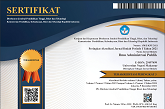Digital Marketing Strategies in the Public Sector of Tourism: Enhancing Promotion and Engagement in the Tourism Industry
(1) Universitas Negeri Makassar
(*) Corresponding Author
DOI: https://doi.org/10.26858/jiap.v13i1.47689
Abstract
This research aims to investigate the effectiveness of digital marketing strategies in the public sector of tourism and their role in enhancing promotion and engagement within the tourism industry. The background of the study highlights the increasing importance of digital platforms in marketing and the need for the public sector to adopt effective strategies to promote tourism. The objective of this research is to analyze the methods employed by public sector organizations in implementing digital marketing strategies and to assess their impact on promotion and engagement in the tourism industry. To achieve this objective, a mixed-methods approach was utilized, combining quantitative analysis of digital marketing campaigns and qualitative interviews with key stakeholders in the public sector of tourism. The quantitative analysis involved evaluating the reach and engagement metrics of various digital marketing initiatives, including social media campaigns, email marketing, and website optimization. The qualitative interviews provided insights into the decision-making processes, challenges, and success factors associated with implementing digital marketing strategies. The findings of this research reveal that effective digital marketing strategies play a crucial role in promoting tourism and enhancing engagement in the public sector. The analysis of digital marketing campaigns demonstrates the significant impact of social media platforms, targeted email marketing, and website optimization in reaching and engaging with the target audience. Additionally, the interviews highlight the importance of collaboration between public sector organizations, private sector stakeholders, and local communities in designing and implementing effective digital marketing strategies.
Keywords
Full Text:
PDFReferences
Chamboko-Mpotaringa, M., & Tichaawa, T. M. (2021). Tourism Digital Marketing Tools and Views on Future Trends: A Systematic Review of Literature. African Journal of Hospitality, Tourism and Leisure. https://doi.org/10.46222/ajhtl.19770720-128
Chen, Y., Fay, S., & Wang, Q. (2011). The role of marketing in social media: How online consumer reviews evolve. Journal of Interactive Marketing, 25(2), 85–94.
Creswell, J. W., & Creswell, J. D. (2017). Research design: Qualitative, quantitative, and mixed methods approaches. Sage publications.
Deb, S. K., Nafi, S. M., & Valeri, M. (2022). Promoting tourism business through digital marketing in the new normal era: a sustainable approach. European Journal of Innovation Management. https://doi.org/10.1108/EJIM-04-2022-0218
Dewantara, M. H., Gardiner, S., & Jin, X. (2022). Travel vlog ecosystem in tourism digital marketing evolution: a narrative literature review. Current Issues in Tourism. https://doi.org/10.1080/13683500.2022.2136568
Duffett, R. G. (2017). Influence of social media marketing communications on young consumers’ attitudes. Young Consumers, 18(1), 19–39.
Getaruelas, R. (2019). Impact of digital marketing in tourism in Oman. Journal of Advanced Research in Dynamical and Control Systems.
Gyimóthy, S., & Munar, A. M. (2014). Digitalisering og sociale medier. In Danmark i det globale turismebillede: Erfaring, tendenser og muligheder. Aalborg Universitetsforlag.
Hartanto, Y., Firmansyah, M. A., & Adhrianti, L. (2022). Implementation Digital Marketing Pesona 88 Curup in to Build Image for the Decision of Visit Tourist Attraction. Proceedings of the 4th Social and Humanities Research Symposium (SoRes 2021). https://doi.org/10.2991/assehr.k.220407.121
Heliany, I. (2019). Wonderful Digital Tourism Indonesia Dan Peran Revolusi Industri Dalam Menghadapi Era Ekonomi Digital 5.0. Destinesia : Jurnal Hospitaliti Dan Pariwisata. https://doi.org/10.31334/jd.v1i1.551
Kayumovich, K. O., Annamuradovna, F. S., Alimovich, F. E., Alisherovna, D. N., & Olimovich, D. I. (2020). Opportunity of digital marketing in tourism sphere. International Journal of Psychosocial Rehabilitation.
Lin, H.-C., Bruning, P. F., & Swarna, H. (2018). Using online opinion leaders to promote the hedonic and utilitarian value of products and services. Business Horizons, 61(3), 431–442.
Litvin, S. W., Goldsmith, R. E., & Pan, B. (2008). Electronic word-of-mouth in hospitality and tourism management. Tourism Management, 29(3), 458–468.
Mkwizu, K. H. (2019). Digital marketing and tourism: opportunities for Africa. International Hospitality Review. https://doi.org/10.1108/ihr-09-2019-0015
Sigala, M. (2003). Developing and benchmarking internet marketing strategies in the hotel sector in Greece. Journal of Hospitality & Tourism Research, 27(4), 375–401.
Slivka, M. (2015). Trends in Digital Marketing in Tourism. Marketing Identity: Digital, Pt I.
Xiang, Z., Du, Q., Ma, Y., & Fan, W. (2017). A comparative analysis of major online review platforms: Implications for social media analytics in hospitality and tourism. Tourism Management, 58, 51–65.
Ye, Q., Law, R., & Gu, B. (2009). The impact of online user reviews on hotel room sales. International Journal of Hospitality Management, 28(1), 180–182.
Article Metrics
Abstract view : 553 times | PDF view : 266 timesRefbacks
- There are currently no refbacks.
Copyright (c) 2023 Ahmad Wahidiyat Haedar

This work is licensed under a Creative Commons Attribution 4.0 International License.
Diterbitkan oleh:
Program Studi Ilmu Administrasi Publik
Program Pascasarjana Universitas Negeri Makassar
JIAP Index By:

This work is licensed under a Creative Commons Attribution 4.0 International License.









